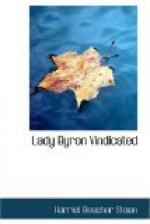For the general public such documents as the ‘Fare thee well’ were circulating in England, and he frankly confessed his wife’s virtues and his own sins to Madame de Stael and others in Switzerland, declaring himself in the wrong, sensible of his errors, and longing to cast himself at the feet of that serene perfection,
‘Which wanted one sweet weakness—to forgive.’
But a little later he drew for his private partisans this bitter poetical indictment against her, which, as we have said, was used discreetly during his life, and published after his death.
Before we proceed to lay that poem before the reader we will refresh his memory with some particulars of the tragedy of AEschylus, which Lord Byron selected as the exact parallel and proper illustration of his wife’s treatment of himself. In his letters and journals he often alludes to her as Clytemnestra, and the allusion has run the round of a thousand American papers lately, and been read by a thousand good honest people, who had no very clear idea who Clytemnestra was, and what she did which was like the proceedings of Lady Byron. According to the tragedy, Clytemnestra secretly hates her husband Agamemnon, whom she professes to love, and wishes to put him out of the way that she may marry her lover, AEgistheus. When her husband returns from the Trojan war she receives him with pretended kindness, and officiously offers to serve him at the bath. Inducing him to put on a garment, of which she had adroitly sewed up the sleeves and neck so as to hamper the use of his arms, she gives the signal to a concealed band of assassins, who rush upon him and stab him. Clytemnestra is represented by AEschylus as grimly triumphing in her success, which leaves her free to marry an adulterous paramour.
’I did it, too, in such a
cunning wise,
That he could neither ’scape
nor ward off doom.
I staked around his steps an endless
net,
As for the fishes.’
In the piece entitled ‘Lines on hearing Lady Byron is ill,’ Lord Byron charges on his wife a similar treachery and cruelty. The whole poem is in Murray’s English edition, Vol. IV. p. 207. Of it we quote the following. The reader will bear in mind that it is addressed to Lady Byron on a sick-bed:—
’I am too well avenged, but
’t was my right;
Whate’er my sins might be,
thou wert not sent
To be the Nemesis that should requite,
Nor did Heaven choose so near an
instrument.
Mercy is for the merciful!
If thou
Hast been of such, ’t will
be accorded now.
Thy nights are banished from the
realms of sleep,
For thou art pillowed on a curse
too deep;
Yes! they may flatter thee, but
thou shalt feel
A hollow agony that will not heal.
Thou hast sown in my sorrow, and
must reap
The bitter harvest in a woe as real.
I have had many foes, but none
like thee;
For ’gainst the rest myself




